We need to understand the difference between self-actualisation and self-realisation: Self-actualisation is like achievement, and self-realisation is like enlightenment. If we look at these two words, the idea of it becomes very clear: Spirituality simply means moving up this ladder. This way you move towards enlightened self-interest; and the next level is enlightened collective interest."
Question: "If you climb up this ladder and eventually you are on the top of it, you´ll have a bigger sense for social side of humanity, the need of many people and not just a small group or yourself. So the task becomes much more difficult. You are like a gardener - Peter Drucker would call this a social ecologist - you are maintaining and fostering a social environment; a group, an enterprise, an organisation or an entire nation."
Sharma: "Yes. There is a thought of collectivity in this. The leader takes care of all the communities and not only a very specific community, he tries to achieve a balance. Now, in our society there are many dialectics, so called multi-variable dialectics ..."
"To understand the needs optimisation we need to look at the two extremes. One is the needs maximisation and the other is the needs minimisation. The middle part of this will lead us towards need optimisation. Modern societies are rooted in the idea of needs maximisation: You want to have one, two, three cars and so on. As a result of that, we are, for example, experiencing climate change. Also a certain amount of social violence is happening, as it increases the gap between the rich and the poor. The other extreme is need minimisation. Now of course in modern societies need minimisation is not feasible; the extreme need minimisation is not possible ... Modern societies should move towards needs optimisation, to prevent more problems arising in the future ..."
In: Wirtschaftspsychologie 2021-3 | Wie wird Führung wirksam?
























